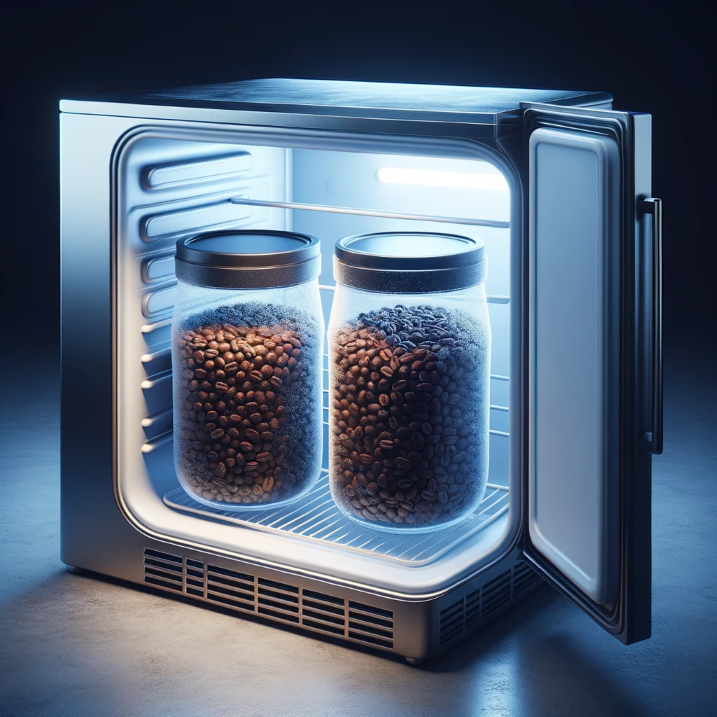Coffee, a beloved beverage around the world, can lose its rich flavors and aromas if not stored correctly. This article tackles the big question: is it better to keep your coffee in the pantry or should you freeze it? Making this decision isn’t just about personal preference; it involves understanding how factors like air, light, moisture, and heat impact your coffee’s freshness.
Properly frozen whole beans stay fresh for up to a month. Vacuum-sealed ground coffee lasts fresh for years in the freezer, but only months without vacuum sealing. Freezing can cause some loss of aromatic oils that influence taste, but retains more of these oils than storage at room or refrigerator temperatures.
To maintain the freshness of your coffee beans in the freezer, it’s important to use an airtight container. Even though most food storage containers seem securely closed, they often allow small amounts of air to enter. Over time, this air exposure can lead to freezer burn or drying out of the beans.
Therefore, ensuring your beans are stored in a completely air-tight container is crucial for preventing any deterioration of quality due to air infiltration over extended periods in the freezer.
The right storage counts because no one enjoys stale coffee.
We will guide you through alternative storage methods like using opaque containers away from harmful elements and ensuring proper sealings such as vacuum-valved bags for substantial time periods.
Our insights come with practical tips on preserving both bean integrity and grounded delicacy long-term.
This discussion extends beyond simple recommendations; we’ll share expert opinions and real-world considerations on freezing versus pantry shelving of coffee so that each sip remains as satisfying as intended.
Get ready to learn how to keep every brew perfect!
Key Takeaways
- Freezing coffee beans can extend their freshness up to a month, but improper freezing may harm the essential oils that give coffee its flavor.
- Store coffee in opaque, airtight containers and keep it in a cool, dark place to maintain its taste and aroma without needing to freeze.
- Vacuum – sealed valve bags are excellent for storing coffee as they prevent air from entering and protect against oxidation.
- When choosing to freeze, divide your coffee into small portions for storage and avoid constant thawing and refreezing which can degrade quality.
- Use high – quality water when brewing stored or frozen coffee, regularly clean all equipment, and consume your supply within a reasonable timeframe to ensure peak freshness.
The Debate: Pantry vs. Freezer for Storing Coffee
When it comes to storing coffee, there’s a debate on whether shelfing or freezing is the best approach. While some argue that freezing coffee can help preserve its freshness for longer periods of time, others believe that it can potentially damage the essential oils in the beans.
Let’s explore both sides and find out when it’s okay to freeze your coffee.
Shelving coffee vs. freezing coffee
You’ve likely faced the decision of whether to shelve or freeze your beloved coffee beans. It’s a common conundrum for coffee aficionados who want to preserve the taste and potency of their favorite brew. Let’s dive into this debate with a streamlined comparison.
| Shelving Coffee | Freezing Coffee |
|---|---|
| Room temperature storage is convenient. | Freezing can extend freshness for up to a month. |
| Air, moisture, heat, and light can impact flavor. | Freezing may affect coffee’s essential oils and flavor. |
| Ideal for coffee consumed within weeks. | Best for long-term preservation of excess beans. |
| Requires airtight containers to maintain freshness. | Demand proper packaging to prevent freezer burn and aroma absorption. |
| Beans may degrade quicker, leading to stale taste. | Research on effects is limited, requiring careful application. |
| Easier access for daily use. | Freeze-dried coffee is preferred for freezing due to its longevity. |
Store your coffee wisely to ensure every cup you pour is as delightful as the last. Remember, expert advice and proper technique are key to maintaining that perfect coffee flavor. Keep exploring ways to keep your coffee fresh, and enjoy the journey of every brew.
When it’s okay to freeze coffee
Navigating the options between shelving and freezing your coffee beans involves understanding when each method is appropriate. Freezing can be ideal, but it’s important to know how to do it correctly to maintain your coffee’s best quality.
- Freeze whole coffee beans for up to a month: This maintains freshness without sacrificing flavor. As per the National Coffee Association, this timeframe prevents taste degradation.
- Store in an airtight container: This shields the beans from unwanted moisture and odors which can occur in a freezer.
- Avoid repeated thawing and refreezing: Doing so can damage the essential oils that give coffee its unique flavors.
- Consider freezing if you buy in bulk: When you have more coffee than you can use quickly, freezing portions can extend their shelf life effectively.
- Use vacuum-sealed bags if possible: These are optimal for preventing oxidation, which can stale the coffee faster.
- Keep instant freeze-dried coffee crystals frozen: They stay fresh longer and even last past their expiration date.
Why Freezing Your Coffee Can Be Beneficial

Freezing your coffee can be beneficial for several reasons. It helps to waste less coffee, as freezing can prolong its freshness and prevent it from going stale. Properly frozen coffee can also retain its flavor for longer periods, ensuring you always have a delicious cup of coffee on hand.
Waste less coffee
Stale coffee isn’t just disappointing—it’s wasteful. To stretch the life of your precious beans and avoid tossing out what doesn’t get brewed, consider freezing as a preservation method.
Vacuum-sealed bags are your best friends here; they fend off freezer burn and flavor-sapping air exposure that can ruin coffee in no time. Packing small amounts minimizes waste since you only thaw what you need for immediate use, maintaining peak freshness with every cup.
Store ground coffee or whole beans in opaque, hermetic zip-lock bags equipped with one-way valves to lock in taste and keep oxygen at bay. This strategy ensures each brew is bursting with the same rich aroma and deep flavor it had on day one.
You’ll not only save money by reducing waste but also enjoy consistently delicious cups without compromising on quality. Keep an eye on storage times too—ground coffee holds its character for months if kept properly chilled away from light and moisture, maximizing both enjoyment and economy in your daily routine.
Helps keep coffee fresh for longer
Freezing small portions of coffee in airtight bags can significantly extend its freshness. Properly frozen coffee can preserve its flavor and aroma for an extended period, reducing the likelihood of spoilage or staleness.
This method also minimizes waste, allowing you to enjoy high-quality coffee without the concern of it losing its essence over time.
By employing vacuum-sealed valve bags or airtight containers, you can effectively maintain the quality and taste of your favorite coffee beans or grounds. Storing them under these conditions helps protect their essential oils and flavors from potential damage caused by exposure to air, moisture, and light.
How to freeze coffee properly
To ensure that your coffee stays fresh and flavorful for an extended period, follow these essential steps for freezing coffee properly:
- Divide the coffee into smaller portions: Split your coffee into manageable portions that you can use in one go. This will help maintain the freshness of the remaining coffee while minimizing exposure to air and moisture.
- Use airtight containers or bags: Place each portion of coffee in airtight containers or resealable bags to prevent any air from entering. Make sure they are sealed tightly to keep the beans or grounds as fresh as possible.
- Label and date the packages: Clearly mark each container with the type of coffee and the date it was frozen. This will help you keep track of how long it has been stored and ensure you use it within a reasonable time frame.
- Remove excess air before sealing: If using resealable bags, press out as much air as possible before sealing them shut. This will minimize any potential for freezer burn and help preserve the flavor of the coffee.
- Store at consistent temperature: Place the packaged coffee in the back of your freezer where temperatures are more stable, avoiding frequent exposure to temperature fluctuations when opening the freezer door.
- Avoid frequent thawing and refreezing: Once you’ve removed a package of frozen coffee, try to use it within a reasonable time frame to avoid multiple thawing and refreezing cycles, which can diminish its quality.
- Thawing before grinding or brewing: Allow frozen coffee to come to room temperature before grinding or brewing to prevent condensation from forming on the beans or grounds.
The Truth About Storing Coffee in the Freezer
Experts have debated whether freezing coffee beans is beneficial for maintaining freshness. Some argue that freezing can potentially damage the essential oils and compromise the flavor of the coffee, while others believe it can help preserve the quality and extend its lifespan.
Let’s delve deeper into this topic to uncover the truth about storing coffee in the freezer.
Claims and responses from experts
Experts in the coffee industry have differing opinions on whether freezing coffee is beneficial. Some argue that freezing can preserve coffee freshness for extended periods, particularly when stored in airtight containers to prevent moisture and odors from affecting the beans.
Others contend that essential oils in the coffee can be damaged due to temperature fluctuations during freezing and thawing, potentially altering the flavor profile of the beans.
New research suggests that dividing coffee into smaller portions before freezing it may mitigate potential damage to essential oils while maintaining freshness. This method could offer an effective compromise for those seeking prolonged storage without sacrificing quality.
Potential damage to essential oils
Claims and responses from experts have shed light on the potential damage to essential oils in coffee beans when stored in the freezer. It’s been established that freezing and thawing coffee can lead to a detrimental impact on these oils, which play a crucial role in determining the flavor and aroma of your brew.
This means that while freezing coffee may help maintain its freshness, it comes at the cost of altering its essential characteristics.
Storing coffee grounds in the freezer is particularly risky as it exposes them to potential issues with their natural oils, ultimately affecting their taste profile. Moreover, there is no evidence suggesting that any improvement in ground consistency can offset the negative effects of condensation caused by freezing.
Freezing Coffee Beans: Pros and Cons
Freezing coffee beans can preserve their freshness and flavors for an extended period, but it also comes with potential drawbacks.
Pros
- Retention of Freshness: Freezing coffee beans helps maintain their optimal flavor and aroma by slowing down the aging process caused by oxidation and degradation.
- Prolonged Shelf Life: By freezing coffee beans, you can extend their lifespan beyond the usual storage period, allowing you to enjoy quality brews for a longer time.
- Preservation of Aroma: Freezing ensures that the aromatic compounds within the beans are retained, resulting in flavorful and enjoyable coffee experiences even after prolonged storage.
- Protection Against Moisture and Heat: The freezing process shields coffee beans from exposure to moisture and heat, preventing them from deteriorating quickly.
- Enhanced Convenience: Frozen coffee beans offer flexibility as you can use them whenever needed without worrying about rapid deterioration or staleness.
Cons
- Potential Flavor Changes: Despite efforts to preserve freshness, freezing may alter the taste profile of the coffee, affecting its original characteristics to some extent.
- Condensation Risks: When not properly sealed or handled during freezing and thawing processes, there is a risk of condensation affecting the quality of the beans.
- Degradation upon Thawing: If not defrosted properly or exposed to varying temperatures during thawing, coffee beans may lose some of their desirable attributes.
- Need for Careful Handling: To maximize benefits and mitigate drawbacks, meticulous handling and proper storage techniques are essential when freezing coffee beans.
Alternatives to Storing Coffee in the Freezer
When it comes to keeping your coffee fresh without freezing, there are alternative methods that can be just as effective. Proper storage in vacuum-sealed valve bags and maintaining ideal conditions for storing coffee are key strategies for preserving freshness.
Proper methods for storing coffee
To maintain the freshness of your coffee, consider these proper storage methods:
- Store in opaque, airtight containers to protect from light and air exposure.
- Keep away from heat sources and direct sunlight to preserve flavor and aroma.
- Use one – way valve bags for whole beans to release CO2 without letting oxygen in.
- Avoid moisture by storing in a cool, dry place to prevent mold or staleness.
- Consider portioning into smaller airtight bags before freezing to minimize exposure.
Vacuum-sealed valve bags
When it comes to preserving the freshness and flavor of your coffee beans for an extended period, vacuum-sealed valve bags emerge as a top choice. These specialized bags effectively prevent air from seeping in, shielding the coffee beans from oxygen exposure that can lead to degradation.
By utilizing this method, you prolong the lifespan of your coffee beans while retaining their aroma and quality over time. Vacuum sealing is proven to be beneficial in maintaining both bulk coffee supplies and smaller portions with equal effectiveness.
To ensure optimal results when using vacuum-sealed valve bags, it’s crucial to store them in a dark place or within opaque packaging. This precaution helps safeguard the coffee beans from light exposure which can compromise their freshness and flavor.
How to keep coffee fresh without freezing
After learning about the benefits of vacuum-sealed valve bags for storing coffee, you may be interested in other methods that can keep your coffee fresh without freezing. Here are some alternative strategies to maintain the freshness and flavor of your beloved coffee beans:
- Optimal storage conditions: Keep your coffee beans in a cool, dark place away from direct sunlight and moisture. Store them in an airtight container to prevent exposure to air, which can lead to oxidation and flavor degradation.
- Proper packaging: Invest in specialized coffee storage containers with airtight seals to maintain the freshness of your beans. These containers help protect the coffee from moisture, air, light, and heat.
- Freshly ground coffee: To preserve the flavor and aroma of your coffee, consider grinding it just before brewing. This helps to retain the essential oils and flavors that can dissipate over time when exposed to air.
- Controlled portioning: Rather than storing large quantities of coffee for extended periods, only purchase or grind enough beans for immediate use. This ensures that every cup of coffee is as fresh as possible.
- Avoid refrigerator storage: Despite common misconceptions, refrigerators are not ideal for storing coffee due to variations in temperature and potential exposure to moisture which can compromise its quality.
- Regular consumption: Enjoying your favorite brew regularly not only brings pleasure but also helps ensure that you go through your supply within a reasonable timeframe, minimizing any deterioration in quality.
- Quality water usage: The quality of water used for brewing also impacts the taste of your coffee. Use filtered or bottled water instead of tap water to create the best-tasting cup possible.
- Clean equipment maintenance: Regularly clean your coffee-making equipment – such as grinders and brewing tools – to remove residual oils and impurities that can affect the taste of your brewed beverage.
Tips for Storing Coffee Beans and Grounds
Properly seal your coffee in airtight containers to protect it from moisture and oxygen, and store it in a cool, dark place away from heat and light. For more detailed tips on maintaining the freshness of your coffee beans and grounds, check out the full article.
Remember that proper storage is key to preserving the quality of your favorite brew.
Tips for long-term storage
To maintain your coffee’s freshness for the long haul, here are some tips that you should consider:
- Use opaque, airtight containers to store your ground coffee or whole beans.
- Invest in storage canisters with an airtight seal for prolonged freshness.
- Consider using bags with a valve to allow degassing before freezing your coffee beans.
- Avoid storing coffee in the refrigerator as it can cause moisture loss due to roasting.
- Explore vacuum – sealing coffee beans and storing them in the freezer to preserve their quality.
- Protect your coffee from air, light, moisture, and heat to maintain its flavors and aromas.
Ideal conditions for storing coffee
After considering the tips for long-term storage, it’s important to understand the ideal conditions for storing coffee. Here are some key factors to consider:
- Temperature: Store coffee in a cool, dry place at room temperature, away from direct sunlight and heat sources to maintain its freshness and flavor.
- Airtight containers: Use airtight containers made of ceramic or metal to protect coffee from exposure to air and moisture, preserving its aroma and taste.
- Dark storage: Keep your coffee in dark-colored or opaque storage containers, as light can degrade the quality of the beans over time.
- Limited air exposure: Minimize the frequency of opening the storage container to reduce airflow and prevent the coffee from absorbing unwanted odors or losing its freshness.
- Moisture control: Ensure that the storage area is free from excess humidity, which can lead to deterioration of the coffee’s flavor and aroma over time.
- Stable environment: Maintain a consistent environment for storing coffee to prevent fluctuations in temperature and humidity that could impact its quality.
- Proper placement: Place your stored coffee away from strong-smelling items in your kitchen or pantry to avoid cross-contamination of flavors.
Conclusion: The Best Way to Keep Your Coffee Fresh
In conclusion, keeping your coffee fresh is crucial to preserving its flavor and quality. Implementing the right storage method can have a significant impact on extending the lifespan of your coffee beans or grounds.
By freezing your coffee properly, you can mitigate waste and maintain its freshness for an extended period. Have you considered incorporating vacuum-sealed valve bags as an alternative to freezer storage? Maximizing the shelf life of your coffee through effective storage methods will undoubtedly enhance your overall coffee experience.
Don’t miss out on exploring additional resources and best practices for optimal coffee storage!
Additional Resources and Best Practices for Coffee Storage
For additional resources and best practices for coffee storage, consider seeking out expert advice from reputable sources such as renowned coffee roasters, professional baristas, or specialty coffee associations.
These sources often provide valuable insights into optimal storage techniques and preservation methods to maintain the quality and freshness of your favorite beans. Additionally, exploring online forums and communities dedicated to coffee enthusiasts can offer practical tips and firsthand experiences from individuals who have successfully preserved their coffee’s flavor and aroma.
Don’t forget to check out guides on proper bean care from trusted industry publications or websites that specialize in sharing comprehensive knowledge about maintaining the quality of your beloved coffee beans.
When it comes to best practices for preserving your coffee’s freshness, keep an eye out for proven strategies recommended by experts within the field of coffee preservation. Look for information on suitable containers, ideal storage conditions, moisture protection methods, flavor retention techniques, and other essential aspects of effective coffee storage.
By incorporating these tried-and-true practices into your routine, you can ensure that you’re optimizing the lifespan and taste profile of your cherished brews while avoiding common pitfalls associated with improper storage.
FAQs
1. Does freezing coffee beans keep them fresh?
Freezing beans can preserve the coffee aroma and prolong its lifespan by slowing down oxidation, but you must handle your coffee carefully to maintain quality.
2. What’s the best way to store coffee for freshness?
For optimal coffee storage that keeps your beans fresh longer, use airtight containers in a cool, dark place to protect against moisture and temperature changes.
3. Can I freeze all types of coffee?
While preserving flavors is key, not all coffee benefits from cold storage; some might lose their special taste qualities, so it’s important to know the right freshness methods for your bean type.
4. How does freezing impact the taste preservation of my coffee?
Freezing can help maintain freshness in beans when done correctly; however, improper techniques may affect taste preservation negatively by introducing unwanted moisture during defrosting.
5. What are some other effective strategies for maintaining my coffee’s flavor and aroma without freezing?
Freshness maintenance includes proper handling—avoid direct sunlight and strong odors—and using freshness preservation tools like vacuum-sealed bags or specialized containers designed for extending the shelf life of your favorite brews.
6. How often should I take out frozen beans if I’ve decided this method works best for me?
Plan ahead: only remove what you’ll use immediately from the freezer to ensure each cup captures that sought-after excellence in both flavor richness and enticing aroma characteristic of freshly ground beans.






